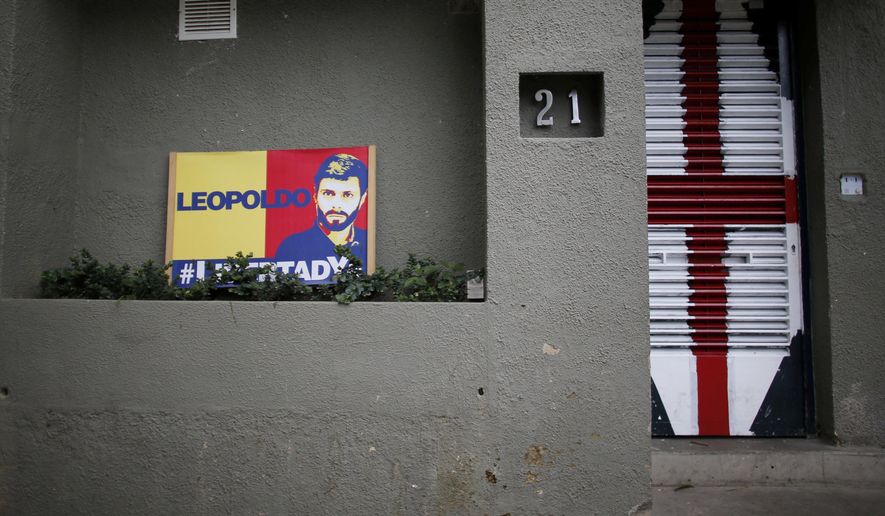President Trump warned Venezuela President Nicolas Maduro on Tuesday night to release two opposition leaders seized by masked government agents and denounced his regime as a “dictatorship.”
“The United States condemns the actions of the Maduro dictatorship,” Mr. Trump said in a statement released hours after the Venezuelan government took opposition figures Leopoldo Lopez and Antonio Ledezma into custody early Tuesday.
“Mr. Lopez and Mr. Ledezma are political prisoners being held illegally by the regime,” Mr. Trump said, adding that Washington would hold Mr. Maduro “personally responsible for the health and safety of Mr. Lopez, Mr. Ledezma, and any others seized.”
“We reiterate our call for the immediate and unconditional release of all political prisoners,” Mr. Trump said.
Treasury Secretary Steven Mnuchin also used the “D-word,” calling Mr. Maduro a “dictator who disregards the will of the Venezuelan people.”
Mr. Lopez and Mr. Ledezma were being held at the Ramo Verde military prison south of the capital, accused by the government-allied Supreme Court of violating the terms of their house arrest by plotting to escape and releasing video statements criticizing Mr. Maduro.
The court, which is controlled by Maduro allies, also said it had received “reports from official intelligence sources” that the two men had been planning to flee.
Both men’s allies denied the charges and vowed to continue to try to push the ruling party from power. But they gave little indication of how they planned to do that, and the capital was unusually quiet after months of sometimes violent protests.
In Caracas, Judges Beatriz Ruiz and Jose Fernando Nunez, who were appointed by Venezuela’s opposition-controlled National Assembly, took refuge in the residence of the Chilean ambassador.
Chilean Foreign Minister Heraldo Munoz tweeted Tuesday that Judges Ruiz and Nunez arrived “in search of protection” and said they have been offered asylum if they want it.
The Trump administration announced Monday that it was issuing sanctions against Mr. Maduro, freezing any U.S. assets he owns, among other measures, in response to human-rights abuses and anti-democratic measures.
The steps came after the leftist government held a disputed election to create a new assembly with the power to change its constitution and give the ruling party nearly unlimited power.
Mr. Lopez’s supporters released a video he taped last week saying he expected to be imprisoned again soon, and calling on Venezuelans to be firm in resisting Mr. Maduro.
“If you are looking at this video now, it’s precisely because that occurred, because they came and they illegally imprisoned me again unjustly, a prisoner of consciousness, a prisoner for my ideas, a prisoner for wanting a better Venezuela,” the 46-year-old Mr. Lopez said.
Mr. Maduro had warned that he would conduct a crackdown on political opponents and appeared undeterred in his plans to seat a special assembly this week with powers to rewrite the country’s constitution and override any other branch of the Venezuelan government.
He appears to have the full support of the country’s most important institutions.
Venezuela’s powerful vice president, whom the U.S. has accused of drug trafficking, said the newly elected constituent assembly would be convening “within hours.”
In remarks aired on Venezuela’s state television, Tareck El Aissami said that results from Sunday’s election have been reviewed and the 545 assembly members would soon take the reins of the nation’s government. He didn’t give a specific time.
Venezuela’s defense minister, Gen. Vladimir Padrino Lopez, also appeared on television Tuesday to affirm his loyalty to Maduro.
“We ask for respect for our democracy, for the way in which we have decided to take the road that we deserve to take in peace, in democracy, with tolerance, without violence and without heading toward a coup,” Gen. Padrino said.
⦁ This article is based in part on wire service reports.
• Dave Boyer can be reached at dboyer@washingtontimes.com.




Please read our comment policy before commenting.